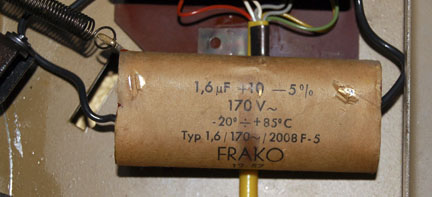perpetuum: A/4 (A4); Rex
? perpetuum: A/4 (A4); Rex
hello.
i'm doing some maintenance on my grundig musikschrank, and i've removed its perpetuum-ebner rex A4 turntable. can someone please help identify this component? i think it's an electrolytic capacitor, but i want to be sure. thank you.
charles

To thank the Author because you find the post helpful or well done.
AC capacitor

Hi Charles,
That is an AC capacitor. Due to its large physical size and fairly small capacitance, one can also conclude that it is most likely not a nonpolarized electrolytic capacitor, but rather a typical paper (or possibly polymer dielectric) capacitor.
As you can read, its capacitance is 1.6 uF, and the voltage rating is 170 VAC. If it needs to be replaced, you can use a modern AC-rated capacitor. You might not be able to find one with a value of 1.6 uF, but if you put a few capacitors in parallel, you can get a value close enough for the +10% / -5% tolerance rating of this capacitor.
Best regards,
Tom
To thank the Author because you find the post helpful or well done.
? whew!
wow! quickest response ever. thanks, thomas.
all best,
charles
To thank the Author because you find the post helpful or well done.
? Resonance for 50Hz?

The capacitor is necessary for the motor. Some turnetables have a split-pole motor with one winding which has an inferior power factor. However, this model obviously has two windings. The second winding needs the voltage with a different phase. This is done with the capacitor.
Normally, the value of the capacitor is chosen according to the frequency of the mains, which is 50Hz in Europe. Only if you have an export model for the States the capacitor has the right value for 60Hz. Else you could test whether a lower value than 1.6μF would behave better.
But keep in mind, the capacitor has to operate with pure AC. So a specimen with rating of more than 170V≈ would be preferable.
Best regards,
Dietmar
To thank the Author because you find the post helpful or well done.
Type of capacitor

Dear Charles,
I can just add a bit of information to the excellent suggestions of Mr. Albrecht and of Prof. Dietmar. When looking for a substitute capacitor, ask for a polypropylene or for a film/foil type, like those used in switching power supply snubbers or in AC line filters. The standard metallized polyester types are not capable of carrying relevant AC currents and may fail.
Best regards,
Emilio
To thank the Author because you find the post helpful or well done.
thank you again
hello herr professor rudolph and signor ciardiello.
your information is most helpful and appreciated, and i thank you.
the motor in this turntable seems to have plenty of power, and the idler wheel has a nice rubber tire. but the small drive belts have become brittle and stretched in the past 50 years. (i've ordered a replacement). i wonder if i should leave this old capacitor in place, since the motor doesn' seem to be out of phase, or is it a given that a 50-year-old paper cap is best replaced? i have a capacitor bridge tester, but i'm afraid to use it, as i don't want to be throwing dc current at this ac-only cap (and possibly damaging it?). thank you again.
all best,
charles
To thank the Author because you find the post helpful or well done.
Testing an AC capacitor

Charles,
There is no problem with testing the AC capacitor; you can use the same equipment that you would use for a DC-rated capacitor without any risk of damaging the capacitor.
In general, the only dangerous thing in testing capacitors is the application of large AC voltages (or reverse polarity DC voltages) to polarized electrolytic or tantalum capacitors. Doing so will often cause a short, with permanent damage to the capacitor (and a heating/bursting of the capacitor if current is not limited).
So you should be careful about applying AC (or wrong polarity DC) to polarized capacitors, but you don't need to worry about applying AC or DC to nonpolarized capacitors.
Go ahead and check that capacitor for leakage if you have a suitable tester. If leakage is high, you may want to replace it as a preventative safety measure, even if the motor is running OK for now. If the capacitor develops a short, the motor may overheat.
If leakage is low, it might be a polymer dielectric capacitor, which generally do not need to be replaced. Perhaps one of our European friends will recognize the particular style of that capacitor and know whether it is a paper capacitor.
To thank the Author because you find the post helpful or well done.
Perpetuum Rex AA Capacitor
Hi All:
I have been following this thread and recently got my radiomuseum wings. So here i am. I am restoring a Rex AA. I have cleaned the motor and lubricated it, and have replaced belts. I am still a few rpms off from any of the speeds.
My question is...
I am suspicious that the capcitor, like the one in this thread, is keeping the amperage from reaching the A/C Motor, hence the slower speeds.
1.) Is that plausable?
2.) Can i get some tips on proving my hypothesis?
3.) If true, how do I select capacitor or capcitors to replace it.
Meanwhile, i am continuually looking at places where the drive can be restricted.
Thanks for your help.
g.
To thank the Author because you find the post helpful or well done.
Motor run capacitor

Glenn,
One capacitor you could use would be this one from Digi-Key: 1.6 uF 400 V polypropylene capacitor
Make sure that the motor bearings and all other bearings in the system are well lubricated, and if necessary replace or get reconditioned any rubber idler wheels or belts if it appears that the motor is running with good torque and speed, but the turntable is slow.
Best regards,
Tom
To thank the Author because you find the post helpful or well done.
AA cap and motor.
Thomas:
So based upon this response, if all other things are in good working order and condition, then it is plausable that the capacitor is restricting the amperage? And by that, it restricts the rpms of the motor.
I am getting a final set of belts. I have cleaned the motor and lubricated but will revisit my work. Thanks for pointing me to the capacitor, that saves me time.
Any tips on how to solder it in, since the originating capacitor is quite large in comparision?
Thanks very much for your help.
g.
To thank the Author because you find the post helpful or well done.
Motor run capacitor

Glenn,
The capacitor could fail in two different ways:
1. It has gone open circuit or too low capacitance
2. It has high leakage or a short circuit
Either way, the voltage and phase of AC current applied to the second winding will be incorrect, and the torque of the motor will be low, or in an extreme case, it might not run at all.
A clean solution for mounting the new capacitor would be to mount a 2-terminal terminal strip (either solder type or screw-terminal) in the position of the old capacitor and join the leads of the new capacitor to the appropriate wires. This would serve both as a good mechanical mount and electrical connection points for the new capacitor. Make sure everything is insulated from the metal base of the turntable.
A cheap and easy alternative would be to attach the new capacitor with some silicone caulk, epoxy, or other suitable adhesive to the metal base with the leads protruding away from the base (so they cannot touch anything they shouldn't). Then cut the leads off fairly short and attach (with solder) wires to the appropriate points from them.
Tom
To thank the Author because you find the post helpful or well done.
Motor run Capacitor
Thomas:
Thanks. As you can tell i am fairly new to restoring radios, but am a fairly quick learner.
I have to announce unfortunately that last night my Grundig wouldn't power up at all. I am in full diagnostic mode.
It went completely dark. No power to the turntable or tuner.
However, on a bright point, i get to use my tube testor and perhaps learn a little more.
Since, i now find me to have a need for futher assistance, can you point me to the forum that I could get some help? or is it appropriate to exchange ideas with you directly?
I am new to the radiomusuem and don't want to misuse the resources.
Regards,
g.
To thank the Author because you find the post helpful or well done.
no power

Glenn,
Why not try applying power directly to your turntable, to see if a new capacitor solves the speed problem. Continuation of that discussion can stay right here, since this thread has mainly focused on the turntable motor and capacitor.
For the general troubleshooting of the electronics, perhaps it would be good to start a new thread, stating the problem in the title so that people see it's more than just the turntable issue of this thread. I'll also try to help you out on that topic.
Tom
To thank the Author because you find the post helpful or well done.
Motor capacity
To thank the Author because you find the post helpful or well done.
Grundig radio-phono?

Hi Glenn,
What mode of Grundig is your turntable part of? I'll be able to give more specific advice once I know what equipment you are working with.
In general, a typical Grundig radio-phono will have a power supply section that includes the power cord, a voltage selector switch, a fuse, the power switch, and a power transformer. There is more in the power supply, but most likely only these items will affect power to the turntable.
You might start by checking whether there is a fuse in the radio power supply (usually located near the voltage selector switch and power cord connection). If it's bad, replace it with the same type (same amperage rating) and test again. I would buy at least one extra fuse, since it may be necessary to diagnose what caused the fuse to blow, and you may lose one more while that question is being pursued. The radio chassis may need a bit of work (replacement of electrolytic and paper capacitors, replacement of selenium rectifiers, etc.); a failure in some of these components may have caused your fuse to blow.
Tom
To thank the Author because you find the post helpful or well done.
TT saga 1 year later
I also posted this in the talk thread. But, I just powered up my TT in the console.
I get a consist hum that i have not experienced with the tape deck input, nor the tuner.
The TT may be a half turn off on rotation. I have replaced the belt. The idler wheel looks good, but then again it could be bad.
Any ideas on located the source of the hum?
g.
To thank the Author because you find the post helpful or well done.